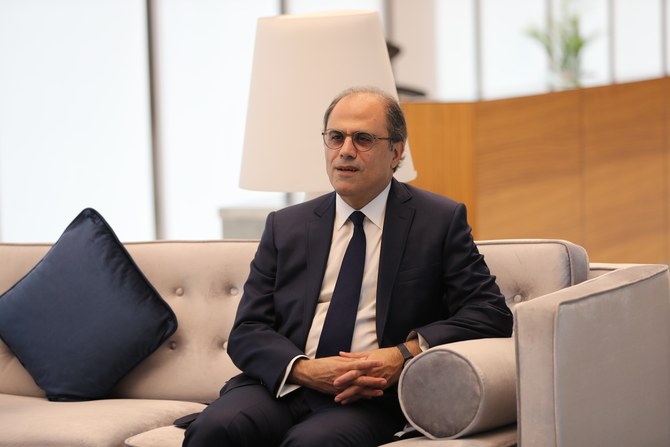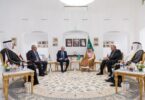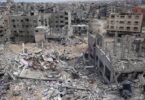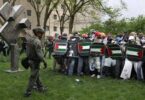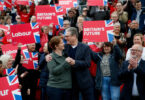Dr. Dania Koleilat Khatib
Al-Akhbar, the pro-Hezbollah media outlet, last week published the following statement: “Foolish is he who does not revise his positions and is under the illusion that he can change the solid existing balance. This is the moment of truth for supporters, electors and candidates alike. For those who want to visit history, the responsibility lies with two people.
The first is Gebran Bassil, who is today in a position similar to Walid Jumblatt in May 2008, where he later admitted that his enthusiasm led him to make a mistake. The second is Jihad Azour, who has become another Fouad Siniora, and accepted to be the detonator fuse of an explosion.”
These few lines were seen by almost everyone in Lebanon as a veiled threat by Hezbollah. They spread like wildfire on social media. On May 7, 2008, initiated by Jumblatt, the Lebanese government issued two decisions: One regarding the firing of the head of security at Beirut airport and the second regarding the communication network of Hezbollah. The group saw the act of exposing its network as an existential threat. If the network was uncovered, this would mean that Israel could hunt down its members one by one. So, Hezbollah used brute force and took to the streets in Beirut. Its members went into Sunni neighborhoods and shouted sectarian slogans. This ignited negative sentiment against the group.
Two years before this incident, the entire country sided with Hezbollah as it was fighting Israel. The act of taking Beirut by force and the show of Shiite power created a huge discontent, which has been increasing ever since. The group has always stated that its arms are intended to protect Lebanon. However, in 2008, the group used its arms against the Lebanese. Though Hezbollah may have been facing an existential threat, its assault on Beirut provided good evidence for their opponents to say that its arms are a threat to the country. Nevertheless, despite the loss of equity the group faced as a result of the week-long crisis, it made a real gain in power. The clashes led to the Doha conference, which gave Hezbollah a blocking third in the government. This way, Hezbollah became sure that the government would not be able to take any decision that could be deemed to pose an existential threat to it.
However, the more it accumulated power, the more discontent increased. Today, Hezbollah finds itself incapable of pushing for its own candidate for president, Suleiman Frangieh, whose loyalty to the group is uncontested, as the opposition is showing a united front. Long-time Hezbollah ally Bassil, seeing that he may have reached the limit of what he can get from the group, is now allying himself with its opponents and is instead nominating Azour, the director of the Middle East and Central Asia Department at the International Monetary Fund and a former finance minister in Siniora’s government. The speaker of the parliament has called for a session to be held on Wednesday. Hezbollah cannot afford for an antagonistic president to be elected, hence the strong message sent through the pro-Hezbollah newspaper. However, this threat will probably not work, as the conditions today are different from 2008. In 2008, the reason why the crisis was contained was mainly because Siniora, who was in charge, did not want to retaliate. He deemed it better to bite the bullet and lose politically, through what happened in Doha, than to lead the country into the unknown.
Nevertheless, the Hezbollah unit that went to the Druze areas loyal to Jumblatt faced fierce resistance. This was not the case in Beirut. Today, if the same scenario was repeated, one cannot expect a measured response, as in 2008. The tensions are very high for the opposition to restrain itself. Also, Samir Geagea is not Siniora. He has a much bolder approach. Meanwhile, on the regional scene, despite the Saudi-Iranian agreement, Hezbollah is viewed as a threat. Its tentacles have reached Syria, Iraq and Yemen. Although the Iranian and Saudi foreign ministers signed an agreement in Beijing in April, we are still far from a full normalization. The region is in labor, waiting for a new arrangement to be born, as suggested by Kassem Kassir, the Lebanese journalist, in his latest article on the situation in the country and its presidential elections.
Any faux pas by Hezbollah will be used by its domestic and regional opponents. It cannot afford a president who might stab them in the back. Though earlier reports of a meeting between Azour and the group may have signaled that he gave assurances that he would focus on economic issues and not venture into controversial ones, there is still much at stake. Azour, who is a seasoned finance expert, could uncover all of Hezbollah’s financial network and help encircle the group. Hezbollah can perhaps see the eventuality of it being strangled financially or killed off without a military confrontation – and this is as dangerous to the group as the prospect of a president who asks them to disarm. Hence, Hezbollah faces the dilemma of either accepting a president who could softly strangle it or entering into a confrontation that would probably not end up being to its advantage, as in 2008. However, the party could opt for a third option by stating that it is ready to abandon its candidate and agree with the opposition on a consensual nominee – a president who would focus on reforms and put partisanship aside.

